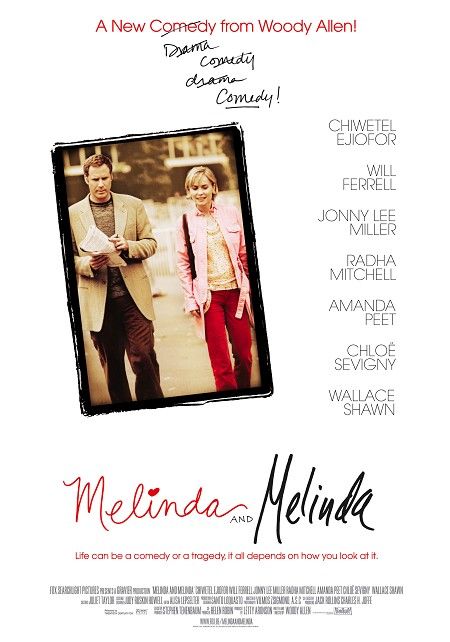“Eat, Drink and Be Merry, for Today You May Die”

| None | Light | Moderate | Heavy | |
|---|---|---|---|---|
| Language | ||||
| Violence | ||||
| Sex | ||||
| Nudity |
What You Need To Know:
Generally well-acted, MELINDA AND MELINDA is funny and at times poignant, passionate and provocative. Though there are no depicted sex scenes, adultery and infidelity are rampant and seen as unavoidable parts of life, and there is plenty of foul language. The movie also has a strong pagan worldview that says, “Eat, drink and be merry, because today you may die.” The discussion of comedy and tragedy is interesting, however.
Content:
(PaPa, Ro, H, PC, LLL, V, S, A, DD, MM) Strong mixed pagan worldview about love and marriage ultimately promoting a kind of hedonism, as well as adultery and infidelity, with some Romantic elements where people follow their feelings, despite negative moral consequences, and humanist and nihilistic view of death, as well as a few politically correct left-wing jokes about conservatives and Republicans; at least four light obscenities, nine strong profanities and 28 light profanities; light violence when woman tries to jump off building and man has to hold her down, and woman confesses getting away with first-degree murder; no depicted sex scenes but people have adulterous desires and adulterous affairs and married woman discovered in bed with another man; no nudity; alcohol use and man has a drinking problem, but his drunkenness and alcoholism is not shown; smoking and woman says she’s just taken lots of pills; and, jealousy, betrayal, infidelity, and lying not rebuked, and neurotic behavior is sometimes mocked.
More Detail:
MELINDA AND MELINDA, his new movie, is about most of these things, and more besides. It is one of his more entertaining, more provocative efforts. Be forewarned, however. Although there are no graphic sex scenes, there is a lot of hanky panky and plenty of foul language. The movie also has a negative view of marriage and makes an argument for hedonism – “Eat, drink and be merry, for today you may die.”
The movie opens in a small bistro in New York City. Two playwrights are arguing about the essence of life. One says that tragedy is the essence of life, but the other one says comedy is the essence of life.
Another man at their table tells them a brief story about a woman, Melinda, who interrupts a dinner party. Although the movie audience doesn’t hear the full story, the man asks the two playwrights to tell the people at their table whether the story is a tragedy or a comedy.
The tragedy playwright then launches into a tragic story featuring Melinda and the people at the dinner party. After the first act or so of this story, the comedy playwright starts telling a comical story about Melinda, who lives down the hall from the married couple holding the dinner party. The movie bounces back and forth between these two stories.
In the tragic story, Melinda has a tragic past. She starts an affair with a black classical music composer, Ellis, who is really interested in her married friend, Laurel, but who backs off when he sees Laurel’s wedding ring. Laurel’s emotional connection with Ellis cannot be denied, however. Things come to a head when Laurel becomes fed up with her own husband’s philandering. This situation is in danger of driving the troubled, fragile Melinda off the deep end.
In the comic story, Melinda’s neighbor, Hobie, has comical troubles with his marriage. That’s because his wife, Susan, is too focused on her burgeoning career as a film director to pay much attention to him. Hobie develops a serious crush on Melinda, but his guilt and Melinda’s new boyfriend comically prevent Hobie from getting together with her.
MELINDA AND MELINDA is funny and at times poignant, passionate and provocative. Chloë Sevigny as Laurel and Chiwetel Ejiofor as Ellis seem to turn in the best performances. Will Ferrell sometimes is not convincing as Hobie, especially in the beginning, and Radha Mitchell as the two Melindas is annoying and affected at times when she tries to portray the nervous anxieties of the tragic Melinda. Otherwise, however, the ensemble cast does an excellent job under Woody Allen’s talented directing and scriptwriting.
Infidelity, betrayal and adultery are major topics in both stories in MELINDA AND MELINDA. Hobie is thinking about cheating on his wife, Susan, with Melinda, and Laurel’s husband Lee is cheating on her, so Laurel considers cheating on him and betraying Melinda by starting an affair with Ellis. Also in both stories, Melinda’s own past contains a wrecked marriage through adultery. In the tragic version, Melinda is also trying to regain visitation rights with her children, but a terrible decision she made threatens her attempt. In the comic version, there are no children involved in Melinda’s past marriage.
What’s the upshot of all this infidelity? In the tragic story, the adultery and betrayal ends badly, but in the comical story, the adultery and betrayal ends in absurdity and a marriage proposal (much like some of Shakespeare’s pastoral comedies). In both, however, the movie suggests that, in the end, people have to follow their feelings, despite the consequences. The movie also suggests, however, that human nature is not perfectible. Thus, human feelings are always unreliable because that’s the way human nature is. Therefore, people should go with the emotional flow. Now, that’s a real tragedy, but it’s a tragedy that can be healed through the Perfect Grace of Jesus Christ’s sacrificial, redemptive death on the Cross.
Despite its moral and spiritual emptiness, MELINDA AND MELINDA’s depiction of human nature is thought provoking. Also provocative is the movie’s debate about tragedy and comedy. Eventually, one character says that human beings crave comedy because life is indeed so tragic. It’s best, therefore, to eat, drink and be merry, because tragedy and death can strike at any moment, when you least expect it. This, of course, is ultimately a hedonistic, immoral and spiritually bankrupt solution that doesn’t really solve the problem of tragedy and death. Even so, comedy remains an important, positive aspect of the life God grants us. Insofar as Woody Allen’s comedies are able to lighten our load and bring some joy, they contain at least a few redemptive qualities.



 - Content:
- Content: 
